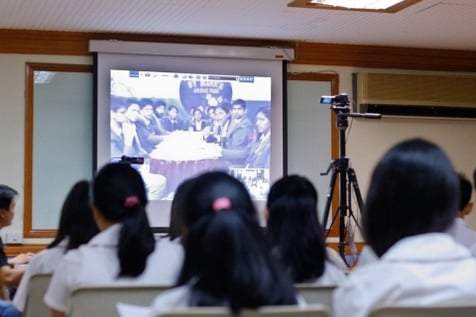Source: 
Today’s technology connects students with their peers around the world, and prepares them for the workplace of tomorrow.
 Virtual meetings and videoconferences have become common in today’s workplace, especially as more people telecommute and do business with colleagues and companies around the globe. So it stands to reason that videoconferencing is something today’s students should become comfortable with. But aside from giving students the technical skills they’ll need for the workplace, videoconferencing also helps build critical empathy skills that help students succeed—and that promote tolerance and peace in a global society.
Virtual meetings and videoconferences have become common in today’s workplace, especially as more people telecommute and do business with colleagues and companies around the globe. So it stands to reason that videoconferencing is something today’s students should become comfortable with. But aside from giving students the technical skills they’ll need for the workplace, videoconferencing also helps build critical empathy skills that help students succeed—and that promote tolerance and peace in a global society.
Videoconferencing offers a convenient way for students to connect with their peers from other countries, societies, and cultures. It can help students learn to evaluate information critically and avoid prejudice as they work with people from different backgrounds.
By connecting with people from other cultures, students learn to understand and appreciate different traditions and beliefs, and they learn how to have productive conversations with others who might hold different points of view. That’s an important skill for life as well as work, making students more desirable to employers while also helping them contribute to a democratic society.
Students from the United States and Palestine recently took part in a special two-week Generation Global project to talk about issues related to their different communities and beliefs. Generation Global offers schools a safe, secure, and moderated videoconferencing platform where students from different countries can participate in dialogues to learn about each other’s beliefs and cultures at no charge.
Many of the participating Palestinian students had never been able to connect with people in other countries before. Students from the U.S. school, meanwhile, represented more than 90 countries with a wide range of cultural and religious backgrounds. All students showed great insight and awareness as they discussed their own roles in society, and their conversation inspired a call to action focused on changing prejudice and improving understanding in the world.
The dialogue coordinator observed that, “From the outset, students at both schools shared with openness, honesty, and self-reflexivity. For example, one student acknowledged that she exists in a bubble of people who share her views; another mentioned income inequality as something he is aware of in his community and would like to address; and another acknowledged that men and women are not always treated equally.”
“It is not always easy to reflect in this way, and students created a safe space to do so from the outset. In describing their beliefs and values, students spoke personally and from a variety of perspectives. They referred to each other by name and shared points of agreement and disagreement. Their questions explored a range of ideas in some depth, through multiple responses—including whether a ‘perfect community’ is ever possible, the opportunities and challenges of more and less diverse communities, family structure, and politics.”
This type of exchange exemplifies the goals of Generation Global, which arose to give students around the world an opportunity to learn the empathy and communication skills they need to live and work with others who have different beliefs, values, and customs.
The importance of creating a safe space where students can discuss sensitive topics comfortably and respectfully cannot be overstated, and the Generation Global platform includes a number of safeguards. Only students and teachers who have signed up and been approved can access Generation Global, and all videoconferences are conducted with an experienced facilitator who is trained to moderate the discussion. All photos and videos are screened by site moderators, and teachers always have access to student content.
Using videoconferencing as a way to foster global dialogue among students has distinct advantages. Watching students converse with one another about their countries and cultures, and about their own prejudices and stereotypes, is an immersive experience. Videoconferencing allows students to ask and answer questions right away, so the conversation can flow naturally. Students feel comfortable discussing what makes their communities unique, what they would like to change, what makes each student an individual, and what beliefs and values are important to them—and they also reflect on what they’ve learned from others.
It’s easier than you might think to fit an empathy-building videoconference into your lessons. Educators have used Generation Global in social studies, language arts, science, history, and world religion classes—and even in advisories or homerooms. For instance, a history lesson about a world event offers a great opportunity for students from the countries involved to hear each other’s perspectives on the event in question. During the process, students can discuss how each country’s experiences and values shape the way students learn about the event in school and their understanding of what happened. World religion students can learn firsthand what beliefs drive other religions, and videoconferencing gives them a chance to meet others who hold those beliefs—thereby building empathy and understanding toward others.
Teamwork and communication are skills that employers value highly. In today’s globally diverse workplace, this means being able to navigate differences successfully. Educators must ensure that students are equipped with the empathy and experience they’ll need to excel in any situation where they are working with others—and videoconferencing is a powerful tech tool that can get them started on the right path.
Dr. Ian Jamison is Head of Education at the Tony Blair Faith Foundation. An experienced trainer, Ian trains teachers around the world on the Generation Global’s pedagogy of dialogue, working in a number of challenging environments. He is an advocate of the power of dialogue for empowering people to address challenges, build understanding, and positively transform societies. Ian taught Religious Education for 20 years, and has experience of subject leadership in a number of schools, including Head of Religious Education. He won the Guardian Award for Teacher of the Year in a Secondary School in 2007. You can follow Generation Global on Twitter @Gen_Global.

